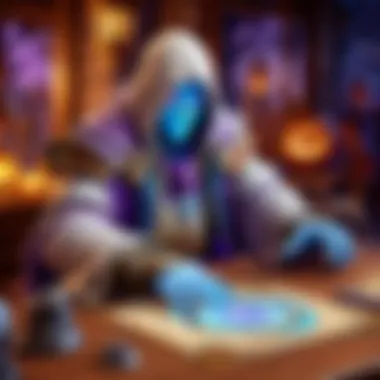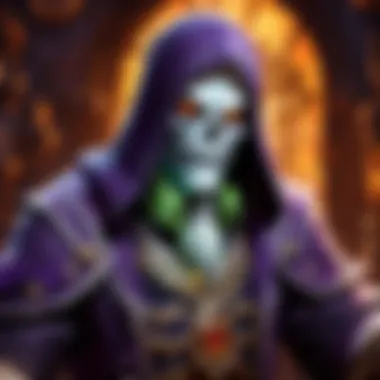Unveiling the Enigma: The Crucial Role of Ghost Screenwriters in Entertainment


Game Updates and Patches
Ghost screenwriters in the entertainment industry share a striking resemblance to the unseen updates and patches in the gaming world. Just like how Hearthstone continually evolves with new content, ghost screenwriters silently shape the narratives of popular films and shows, often remaining unnoticed. The intricate details added to gameplay mirrors the depth these screenwriters bring to scripts and storylines, enhancing the viewer's experience.
Deck Strategies and Meta Analysis
Similarly to how top deck recommendations cater to different play styles in Hearthstone, ghost screenwriters adapt their writing styles to fit various genres and audience preferences. By understanding the current meta and incorporating popular trends, ghost screenwriters create engaging storylines that resonate with viewers. Strategies for countering decks align with how these writers craft plot twists and character developments, keeping audiences hooked.
Card Reviews and Set Reviews
Just as players delve into in-depth card reviews and synergies within deck archetypes, ghost screenwriters meticulously evaluate plot points and character motivations to ensure a seamless storyline. The evaluation of competitive viability in set reviews parallels how these writers aim to produce commercially successful scripts that captivate audiences. By focusing on value, versatility, and narrative strength, ghost screenwriters aim to create stories that stand the test of time.
Player Guides and Tips
Ghost screenwriters act as guides, offering audiences a backstage pass into the world of storytelling. Much like beginner's guides help new players grasp core game mechanics, ghost screenwriters establish a solid foundation for the narrative's progression. Advanced tips provided by these writers offer insights into crafting intricate plot twists and engaging dialogues. Just as arena-specific gameplay tips enhance gaming strategies, ghost screenwriters provide valuable advice on character development and plot intricacies to elevate the overall viewing experience.
Introduction
Ghost screenwriting, a clandestine realm within the entertainment industry that often escapes the spotlight, embodies a pivotal yet underappreciated role. As we embark on unraveling the enigma surrounding ghost screenwriters, it becomes clear that their contributions form the backbone of many acclaimed narratives. This article delves into the covert operations of these invisible architects of storytelling, shedding light on their craft and the intricate dynamics at play behind the scenes.
Defining the Enigmatic Role
The concept of ghost screenwriting
Ghost screenwriting, a practice shrouded in secrecy, involves the creation of scripts by uncredited writers. This concept, offering a veil of invisibility to its practitioners, enables them to weave compelling stories without the glare of recognition. The allure of remaining in the shadows while crafting impactful scripts is a key characteristic of ghost screenwriting, appealing to those who prioritize the sanctity of storytelling over personal acclaim.
Anonymity and confidentiality in the industry
The realm of ghost screenwriting thrives on the pillars of anonymity and confidentiality. These facets are instrumental in safeguarding the identities of writers and preserving the mystique surrounding their work. While these attributes provide a cloak of protection, ensuring the focus remains solely on the narrative, they also introduce challenges concerning authorship and recognition. Balancing the scales between anonymity and acknowledgement poses a perpetual dilemma for ghost screenwriters.
Significance of Ghost Screenwriters
Impact on the quality of scripts


Ghost screenwriters wield a significant influence on the quality of scripts churned out by the entertainment industry. Their adeptness at transforming raw ideas into polished storylines injects a distinct depth and dimension into narratives. The symbiotic relationship between credited and ghost writers results in a harmonious blend of creativity and pragmatism, elevating the script to new heights of excellence.
Role in shaping narratives
Central to shaping narratives, ghost screenwriters play a nuanced role in molding the arcs, dialogues, and themes that resonate with audiences. Their ability to perceive the pulse of storytelling and tailor scripts to align with the vision of producers and directors is a skill revered in the industry. By infusing their unique perspectives and expertise, ghost screenwriters contribute significantly to the cohesive flow and emotional impact of the final product.
Insights into the Craft
In the multifaceted landscape of the entertainment industry, the segment titled 'Insights into the Craft' assumes paramount significance. This section embodies the core essence of ghost screenwriting, encapsulating the intricate processes and nuances underpinning this enigmatic profession. By delving deeper into the methodologies and techniques employed by ghost screenwriters, readers are afforded a comprehensive overview of the meticulous artistry that defines this covert domain. Through a detailed exploration of the collaborative dynamics and research methodologies prevalent in ghost screenwriting, this section serves as a foundational pillar in unraveling the mysteries surrounding this clandestine profession.
Collaborative Process
Working with Credited Writers:
Within the clandestine realm of ghost screenwriting, collaborating with credited writers stands as a pivotal aspect that underpins the collaborative process. The integration of esteemed writers into the creative framework of ghost screenwriting not only enhances the narrative depth and complexity of scripts but also contributes significantly to the overall quality and coherence of the final product. The synergistic partnership between ghost screenwriters and credited writers fosters a dynamic exchange of ideas and perspectives, paving the way for the seamless amalgamation of distinctive writing styles and storytelling techniques. This symbiotic relationship between ghost screenwriters and credited writers cultivates a rich tapestry of literary brilliance, elevating the overarching narrative to unparalleled heights within the annals of the entertainment industry. The fusion of diverse writing expertise and creative vision epitomizes the harmonious convergence of talent and ingenuity, thereby enriching the creative tapestry of ghost screenwriting endeavors.
Adapting to Varied Writing Styles:
Adaptability lies at the crux of ghost screenwriting, with the process of adapting to varied writing styles emerging as a cornerstone of this intricate craft. The ability to seamlessly transition between diverse writing styles and thematic elements is quintessential for ghost screenwriters, as it not only demonstrates their versatility but also underscores their adeptness in tailoring scripts to suit specific narrative requirements. By adeptly navigating through an array of writing styles ranging from suspenseful thrillers to poignant dramas, ghost screenwriters exhibit a rare caliber of literary versatility that enables them to cater to the varied demands of the entertainment industry. This proficiency in adapting to diverse writing styles amplifies the scope and appeal of ghost screenwriting initiatives, positioning ghost screenwriters as indispensable maestros of storytelling who possess the acumen to traverse diverse narrative terrains with finesse and poise. The adeptness of ghost screenwriters in seamlessly integrating varied writing styles into their repertoire underscores their prowess as master storytellers, capable of weaving captivating tales that resonate with audiences on a profound emotional level.
Research and Adaptation
In-depth Research Requirements:
The cornerstone of impeccable ghost screenwriting lies in the meticulous attention to detail and unwavering commitment to in-depth research requirements. The imperative need for exhaustive research underscores the essence of authenticity and credibility in ghost screenwriting endeavors, as it empowers writers to infuse narratives with a sense of realism and factual accuracy. From historical accuracies to technological advancements, ghost screenwriters are tasked with embarking on a comprehensive research odyssey that equips them with the requisite knowledge and insights to craft compelling and factually robust scripts. The arduous journey of delving into the depths of research domains enkindles a spirit of intellectual curiosity within ghost screenwriters, propelling them towards a relentless pursuit of knowledge and enlightenment. The synergy between comprehensive research endeavors and narrative adaptation culminates in the seamless fusion of factual accuracy and creative ingenuity, engendering a narrative landscape imbued with authenticity and depth.
Maintaining Authenticity of the Original Writer's Voice:
Preserving the authenticity of the original writer's voice represents a cardinal tenet in ghost screenwriting, accentuating the significance of upholding the integrity and essence of the original creator's vision. The profound responsibility entrusted upon ghost screenwriters to retain the intrinsic voice and narrative style of the original writer necessitates a meticulous approach towards the art of adaptation. By immersing themselves in the literary universe crafted by the original writer, ghost screenwriters pay homage to the creative genius that crystallized the foundational essence of the script, thereby ensuring the continuity of thematic coherence and stylistic finesse throughout the adaptation process. The painstaking efforts invested in maintaining the authenticity of the original writer's voice exemplify the unwavering dedication and reverence that ghost screenwriters harbor towards the seminal works of their predecessors. This steadfast commitment towards preserving the narrative integrity and voice of the original writer underscores the ethical ethos that underpins the realm of ghost screenwriting, amplifying the reverence and admiration bestowed upon these invisible architects of storytelling.
Challenges Faced
Exploring the challenges faced by ghost screenwriters in the entertainment industry is crucial to understanding the complexities of their profession. These challenges are the hidden barriers that impede their recognition and hinder their career progression. By shedding light on these obstacles, we can appreciate the resilience and fortitude required to navigate through such a clandestine world. The challenges faced encompass a myriad of issues, from lack of acknowledgment to confidentiality dilemmas, presenting a multifaceted landscape that demands attention and scrutiny.


Lack of Recognition
Issues of receiving due credit
Delving into the intricate realm of ghost screenwriting unveils the pervasive issue of receiving due credit. This fundamental aspect not only affects the credibility of the writer but also shapes the perceptions of their contributions. The covert nature of ghostwriting often leads to unattributed work, which can profoundly impact the writer's morale and artistic integrity. Despite their significant input, ghost screenwriters frequently find themselves in the shadows, battling against the tide of anonymity.
Overcoming the challenges of receiving due credit requires a delicate balancing act of advocating for oneself while adhering to the industry's norms of confidentiality. The lack of recognition not only undermines the writer's efforts but also jeopardizes their future prospects within the competitive landscape of the entertainment industry. Addressing these issues is paramount in elevating the status of ghost screenwriters and fostering a culture of acknowledgment and appreciation.
Impact on career progression
The impact of the absence of recognition on a ghost screenwriter's career progression cannot be overstated. Without the visibility and validation that come with credited work, these talented individuals face formidable barriers to advancing in their field. The lack of a visible portfolio and industry acknowledgment hinders their ability to secure future projects and collaborations, ultimately stunting their professional growth.
Navigating the intricate web of career progression as a ghost screenwriter demands perseverance and strategic maneuvering. The onus falls on these writers to advocate for themselves, negotiate favorable terms, and forge meaningful connections within the industry to bypass the hurdles posed by the absence of recognition.
Confidentiality Dilemmas
Balancing secrecy and acknowledgment
The fine line between maintaining secrecy and seeking acknowledgment poses a significant dilemma for ghost screenwriters. Balancing the need for anonymity with the desire for recognition requires a delicate touch and a nuanced approach. While confidentiality is paramount in the world of ghostwriting, the absence of acknowledgment can create a sense of invisibility and undermine the writer's sense of worth.
Striking a harmonious balance between secrecy and acknowledgment entails advocating for professional recognition without compromising the contractual obligations of confidentiality. Navigating these waters requires a keen understanding of industry norms and ethical considerations to ensure that the writer's contributions are valued and respected.
Legal implications and contracts
The realm of ghost screenwriting is fraught with legal implications and contractual intricacies that shape the dynamics of this profession. From non-disclosure agreements to complex contractual clauses, ghost screenwriters must maneuver through a labyrinth of legal frameworks to protect their work and uphold their rights. While these legal safeguards are essential in preserving the integrity of the writer's contributions, they also present challenges in terms of negotiating fair terms and asserting ownership over their work.
Understanding the legal implications and contractual obligations inherent in ghost screenwriting is essential for safeguarding the writer's intellectual property and ensuring fair compensation for their services. By navigating these legal complexities with prudence and foresight, ghost screenwriters can protect their interests and uphold professional standards within the industry.
Ethical Considerations
Authorship and Integrity
Impact on original creator's vision


When contemplating the Impact on the original creator's vision within the context of ghost screenwriting, we unearth a fundamental aspect that influences the essence and direction of a script. The ghost screenwriter, by embodying the voice and narrative of the credited author, shapes the vision into a cohesive and compelling storyline. This process necessitates a deep understanding of the original creator's intentions, thematic nuances, and character dynamics. While respecting the core vision, the ghost screenwriter's interpretation infuses fresh perspectives and writing styles, enriching the script's depth and emotive resonance. Despite the essential role in fine-tuning the original vision, the ghost screenwriter's contribution remains obscured, posing challenges to widespread recognition and acknowledgment within the industry.
Respecting intellectual property
Within the ethereal realms of ghost screenwriting, the aspect of Respecting intellectual property emerges as a cornerstone of ethical practice and professional integrity. This principle encapsulates the duty to uphold the original creator's rights, ensuring that their intellectual labor is safeguarded and honored throughout the creative process. By respecting intellectual property, ghost screenwriters navigate the delicate balance between inspiration and infringement, thereby fostering a culture of respect and legality within the collaborative domain. By conscientiously acknowledging and preserving the authenticity of the original creator's ideas and expressions, ghost screenwriters uphold the sanctity of intellectual property rights, paving the way for ethical professional conduct and sustainable creative partnerships.
The Future of Ghost Screenwriting
In the evolving landscape of the entertainment industry, the future of ghost screenwriting stands as a crucial topic demanding attention and analysis. As the dynamics of storytelling shift with technological advancements and changing audience preferences, understanding the trajectory of ghost screenwriting becomes indispensable. This section explores key elements and considerations vital to grasping the imminent evolution in this enigmatic craft.
Evolution in the Digital Era
Adapting to changing industry dynamics
Delving into the realm of adapting to changing industry dynamics reveals a pivotal aspect of ghost screenwriting's future. The ability to navigate the ever-shifting landscapes of film and television production is essential for sustainability and relevance. This section sheds light on how ghost screenwriters must adeptly adjust their approaches to align with industry trends, technological innovations, and emerging audience tastes. Fostering flexibility and agility becomes paramount as the digital era continues to revolutionize the entertainment domain.
This facet of ghost screenwriting underscores the need to stay attuned to market demands and audience preferences, ensuring narratives resonate amidst the dynamic industry milieu. Embracing change and proactively adapting strategies and techniques can propel ghost screenwriters towards continued success. While challenges may arise in synchronizing with industry shifts, the rewards of staying abreast of changing dynamics are immense, fostering creativity, innovation, and resonance in storytelling.
Opportunities in streaming platforms
Exploring the landscape of opportunities in streaming platforms unveils a realm of possibilities for ghost screenwriters to harness and explore. The rise of digital streaming services has revolutionized content consumption, paving the way for diverse storytelling formats and themes. This section delves into how ghost screenwriters can leverage streaming platforms to reach wider audiences, experiment with narrative structures, and engage viewers in innovative ways.
The key characteristic of opportunities in streaming platforms lies in the democratization of content creation and distribution, offering a fertile ground for undiscovered talents and unique voices to thrive. Ghost screenwriters can tap into this digital landscape to collaborate with global creators, experiment with cross-genre storytelling, and push boundaries in narrative construction. The unique feature of streaming platforms lies in their direct connection with audiences, enabling real-time feedback and fostering interactive storytelling experiences.
Navigating the terrain of streaming platforms presents both advantages and disadvantages for ghost screenwriters. While the potential for global reach and creative freedom is vast, the competitive nature of the digital space calls for strategic positioning and distinctiveness to stand out amidst a sea of content. Embracing the opportunities in streaming platforms requires adaptability, innovative thinking, and a keen understanding of the digital audience's preferences and behaviors.
Conclusion
Written in a specific tone between formal and informal, the Conclusion of this article serves as a crucial segment that encapsulates the essence and significance of ghost screenwriting in the entertainment industry. It is paramount to underscore the pivotal role played by these unseen creators in shaping the narratives that captivate audiences worldwide. By delving into the clandestine realm of ghost screenwriters, we gain a deeper appreciation for the complexity and artistry involved behind the scenes. Furthermore, the Conclusion acts as a reflective piece, prompting us to rethink our perceptions of authorship, recognition, and the ethical considerations inherent in this enigmatic profession. In essence, the Conclusion serves as a compelling call to action, urging industry stakeholders to acknowledge and honor the unsung heroes who labor in the shadows to bring stories to life.
Unveiling the Unseen
The enigmatic world of ghost screenwriting
In unraveling the enigmatic world of ghost screenwriting, we are confronted with a realm shrouded in secrecy and intrigue. This specific aspect sheds light on the covert operations and intricate processes that define the work of ghost screenwriters. It is imperative to grasp the meticulous attention to detail and adaptability required in this domain. The key characteristic of the enigmatic world of ghost screenwriting lies in its ability to seamlessly blend creativity with anonymity, allowing for a seamless integration of diverse voices and perspectives. This advantageous feature ensures that films and scripts bear the mark of collaborative genius while preserving the original writer's vision. Despite its benefits, the enigmatic world of ghost screenwriting also poses challenges, particularly concerning issues of attribution and recognition. However, these obstacles only serve to underscore the resilience and dedication of ghost screenwriters in the face of adversity.
Appreciating the unsung heroes
Appreciating the unsung heroes within the realm of ghost screenwriting is a vital component of this article, emphasizing the invaluable contributions of these invisible craftsmen. The key characteristic of appreciating the unsung heroes lies in its ability to shine a spotlight on the creative talent and sheer dedication of ghost screenwriters. This aspect highlights the selfless nature of their work, where personal acclaim takes a backseat to the success of the projects they enhance. By recognizing the unsung heroes, we acknowledge the immense impact they have on the entertainment landscape, driving innovation and pushing the boundaries of storytelling. Despite the inherent challenges and sacrifices involved, these unseen heroes continue to toil in the shadows, driven by a passion for the craft and a commitment to excellence that transcends recognition or fame. Ultimately, appreciating the unsung heroes is not only a tribute to their artistry but also a nod to their indomitable spirit and unwavering dedication to their craft.







